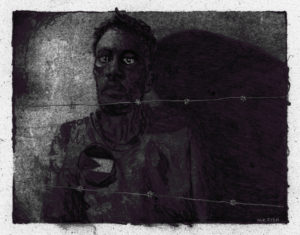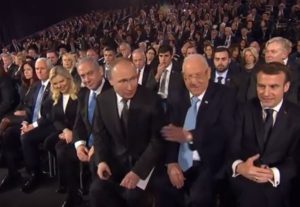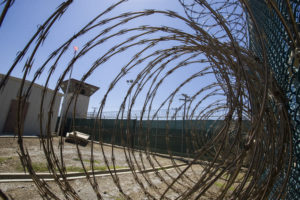Giving Israel a Pass
The former "60 Minutes" producer laments the unfortunate tendency to treat any criticism of Israel as an attack on the Jewish people and a denial of their past suffering.As I was reading through several news items last week on the Internet about the appalling situation in Gaza, I received an e-mail alert from my wife. It had been forwarded to her by a Parisian friend who is an expert in Orientalist art; she had received it from a well-known French television actress.
According to the alert, courses in England about the Shoah had just been withdrawn from British schools because they “shocked the Muslim population which denies the existence of the Holocaust.”
The e-mail continued, “This is a frightening portent of the fear that is gripping the world and how easily each country is giving into it.
“Now, more than ever, with Iran, among others, claiming the Holocaust to be ‘a myth,’ it is imperative to make sure the world never forgets. This e-mail is intended to reach 40 million people worldwide!
“Join us and be a link in the memorial chain and help us distribute it around the world.”
My attention was now torn from the plight of the Palestinians in Gaza and shifted to the charge that British schools had just stopped teaching the Holocaust.
My curiosity piqued — I hadn’t heard that news about Britain — I went to Snopes.com, a Web site that examines such charges. The story, it turned out, first appeared in April 2007, not last week; according to the site, the report was also wildly inaccurate.
The truth was that “One history department in a northern UK city stopped teaching about the Holocaust because it wished to avoid confronting anti-Semitic sentiment and Holocaust denial among some Muslim pupils.”
That fact was originally disseminated in a government-sponsored study — a study which was then grossly misreported by a British newspaper to indicate that, rather than in just one history department in the northern UK, Holocaust studies had been terminated across the country.
That error was further magnified by a British group which launched a worldwide alarm on the Internet with the headline: “Recently, this week, UK removed The Holocaust from its school curriculum. … “
The group made an urgent plea for a global “chain of memory” — the same plea that my wife had just forwarded to me. In other words, nine months later it was still careening around the Internet.
In the process the message had become further distorted. In September 2007, someone surmised that the “UK” as in “UK removed The Holocaust from its school curriculum” referred not to a country but to the University of Kentucky. A slight “fix” was made in the message, and a new storm of outrage zapped across the Internet, now targeting a hapless American university.
On Nov. 8, 2007, UK Assistant Provost Richard B. Geissman issued a press release categorically denying that the university had cut Holocaust studies from its curriculum. “The academic administration of the University of Kentucky,” he declared, “would never permit such a grotesque lapse in its commitment to the principle of academic freedom.”
I found that Snopes.com had also investigated another similar flurry: “Human rights groups are raising alarms over a new law passed by the Iranian parliament that would require the country’s Jews and Christians to wear colored badges to identify them and other religious minorities as non-Muslims,” began that e-mail.
The e-mail quoted Rabbi Marvin Hier, dean of the Simon Wiesenthal Center in Los Angeles, as saying, “This is reminiscent of the Holocaust. Iran is moving closer and closer to the ideology of the Nazis.
“Iran’s roughly 25,000 Jews would have to sew a yellow strip of cloth on the front of their clothes, while Christians would wear red badges and Zoroastrians would be forced to wear blue cloth. …
“The world should not ignore this,” said Rabbi Hier. “The world ignored Hitler for many years — he was dismissed as a demagogue, they said he’d never come to power — and we were all wrong.”
That story also turned out to be false.
Which is not to say anti-Semitism is no longer a problem in the world. Of course it is. But surely it is not the major threat to humanity that this planet confronts.
The question I raise is this:
Why is it that so many of my fellow Jews have a hair-trigger response to the slightest suggestion that anti-Semites may once again be on the prowl in England or France or Iran — that another Hitler lurks just over the horizon?
Why are they so quick to demand that academics who suggest that Jews wield considerable political influence be banned from speaking, or, better yet, fired? Why so ready to dismiss criticism of Israel from Desmond Tutu or Jimmy Carter as anti-Semitic garbage? Why so swift to call meetings, launch petitions, take to the streets, bombard their congressmen, demand embargoes, sanctions, pre-emptive strikes, targeted bombings, invasions — whatever it takes to destroy any perceived menace to Jews or the state of Israel, even if it later turns out the threat was a fabrication of someone’s inflamed imagination?
“Well, why not?” comes the reply. “Better to act than to remain silent. Are you saying we have no enemies? That there was no Holocaust? We know how the world stood by as our people were slaughtered by Hitler. If history has taught us anything, it’s that we Jews have to defend ourselves. Never Again!”
But never again what? Never again massacres of Jews as the world looks on? Or never again should we Jews, who suffered so horrifically in the Holocaust, never again should we stand silent as innocents are slaughtered or driven from their homes by ethnic cleansing, or entire populations are punished for the actions of a few.
To get to the point, what causes so many Jews to turn ethically deaf and morally blind when the state of Israel itself is concerned?
As Sara Roy, a senior research scholar at the Center for Middle Eastern Studies at Harvard University, asked in an essay, “Why is it virtually mandatory among Jewish intellectuals to oppose racism, repression and injustice almost anywhere in the world and unacceptable — indeed, for some, an act of heresy — to oppose it when Israel is the oppressor, choosing concealment over exposure?”
I continue: Why the refusal to recognize that in 1947 and 1948 Jewish fighters embarked upon a policy of ethnic cleansing that succeeded in driving tens of thousands of Palestinians from their fields and villages?
This is not a charge made by hate-filled Iranian or Syrian propagandists but one that has been meticulously researched and documented by Israeli historians themselves.
Why the reluctance to speak out when Israeli forces wreaked appalling death and destruction among civilians after they invaded Lebanon in 1982 and again last summer?
Hundreds of Jewish soldiers in Israel refused to take part in the campaigns. Tens of thousands of Israelis took to the streets in protest. Why were major Jewish organizations in the rest of the world so silent?
Why no horrified response to Israeli leaders who measure success these days in body counts and order so-called targeted assassinations with rockets in densely populated civilian areas, knowing that many innocents may be blown apart for every terrorist who is hit? Are the 27 decorated Israeli pilots who refused to take part in such attacks to be considered anti-Semitic by their American cousins?
Why no outcry when Israel launches a brutal blockade — a collective punishment of 1.5 million Palestinian men, women and children — threatening their supplies of fuel, food and medicines?Israel’s own domestic Jewish critics, far more vociferous than most Jews abroad, point out that there is another way to end the rocket attacks from Gaza against Israeli settlers: Start talking with Hamas. You wouldn’t know it from most of the American media, but Hamas has, in fact, repeatedly offered a cease-fire if Israel will also cease targeted assassinations and attacks on Gaza.
Israel, however, refuses to talk to Hamas. To do so would be to recognize the movement, just as the United States refuses to open unconditional talks with Iran. Instead, the Israeli government continues its bloody dead-end policies.
I was in the course of such reflections when I received the e-mail alert from my wife about the purported end of Holocaust studies in the UK.
Of course, one way of not forgetting the Holocaust would be for the same people who call for a global “chain of memory” to also condemn both Hamas’ rocket attacks and Israel’s brutal policies, and demand that Israel explore the Hamas offer of a cease-fire. What better option does Israel have?
It’s as if, because of the horrendous suffering of Jews in the Holocaust, Israel has won the right to ignore international law, to visit mayhem on civilians and terrorist fighters alike in the name of national survival. It’s been given a free pass. Those attacking the country’s policies are either hopelessly naive, anti-Semites or self-hating Jews.
That’s the position of AIPAC (the American Israel Public Affairs Committee), the very conservative Washington lobby which claims to represent most American Jews interested in Israel. AIPAC has donned this mantle by default. Surveys indicate that the majority of American Jews hold views more liberal than most Americans. The problem is they no longer feel strongly tied to or concerned about Israel. Many other Jews, though morally uncomfortable with Israel’s policies, have kept silent, not wanting to publicly criticize the Zionist state.
The upshot is that the role of lobbying U.S. policy in the Middle East has been left to organizations whose members do strongly care about Israel, like AIPAC.
AIPAC doesn’t dictate single-handedly Washington’s Middle Eastern policy, but it is one of the most powerful lobbies in the capital. That’s a fact Jews relish discussing among themselves, but are quick to brand an anti-Semitic fabrication if the charge is made publicly.
A few years back I did a report on AIPAC for “60 Minutes” with Mike Wallace. One after another, all the congressional offices I contacted confirmed the tremendous influence that AIPAC wielded, and the fear that could be inspired by an AIPAC threat to target a particular candidate.
We were, however, unable to convince a single sitting House member, senator or staff person to talk on the record. Not that they disagreed with the premise. They were just terrified of taking about AIPAC.
That included the late John Chafee, the powerful U.S. senator from Rhode Island, who at the time was being targeted by AIPAC in his re-election campaign. Normally a stalwart supporter of Israel, Chafee had once contravened AIPAC policy by voting to supply an AWACS plane to Saudi Arabia.
When the report was finally aired, it was the target of more irate mail and phone calls from Jewish organizations across the country than just about any other report I ever did for “60 Minutes.”
There are signs, however, that the situation could be changing, that more Jewish individuals and groups in the United States — as well as in Europe — are willing to criticize Israel’s policies. Groups like Peace Now, activists like Rabbi Michael Lerner in California, journalists and bloggers like Richard Silverstein, who recently forwarded me the Sara Roy essay I’ve quoted above, which says in part:
” … The Jewish community demands unity and conformity: ‘Stand with Israel’ read the banners on synagogues throughout Boston last summer. Unity around what? There is enormous pressure — indeed coercion — within organized American Jewry to present an image of ‘wall to wall unity’ as a local Jewish leader put it. But this unity is an illusion — at its edges a smoldering flame rapidly engulfing its core — for mainstream Jewry does not speak for me or for many other Jews. And where such unity exists, it is hollow built around fear not humanity, on the need to understand reality as it has long been constructed for us — with the Jew as the righteous victim, the innocent incapable of harm.”
A solemn visit to the Holocaust Memorial in Jerusalem was de rigueur for President George W. Bush during his recent trip to Israel, just as it is for any other foreign dignitary. Israel uses these ceremonies to convey a message: You see, Mr. President and the world looking in, this is what our people suffered from our enemies. This is why we have the right — indeed the duty — to act in any way we judge necessary to ensure our nation’s survival.
Imagine, instead a different message: This is to put you on notice, Mr. President and the rest of the world. We ask that you join with us in our determination to ensure that such atrocities as we Jews suffered shall never again be visited on any people by any state — including our own.
Barry M. Lando, a graduate of Harvard and Columbia University, spent 25 years as an award-winning investigative producer with “60 Minutes.” Author of numerous articles about Iraq, he produced a documentary about Saddam Hussein that has been shown around the world. He lives in Paris. His latest book is “Web of Deceit: The History of Western Complicity in Iraq, From Churchill to Kennedy to George W. Bush.”
Your support is crucial…With an uncertain future and a new administration casting doubt on press freedoms, the danger is clear: The truth is at risk.
Now is the time to give. Your tax-deductible support allows us to dig deeper, delivering fearless investigative reporting and analysis that exposes what’s really happening — without compromise.
Stand with our courageous journalists. Donate today to protect a free press, uphold democracy and unearth untold stories.






You need to be a supporter to comment.
There are currently no responses to this article.
Be the first to respond.